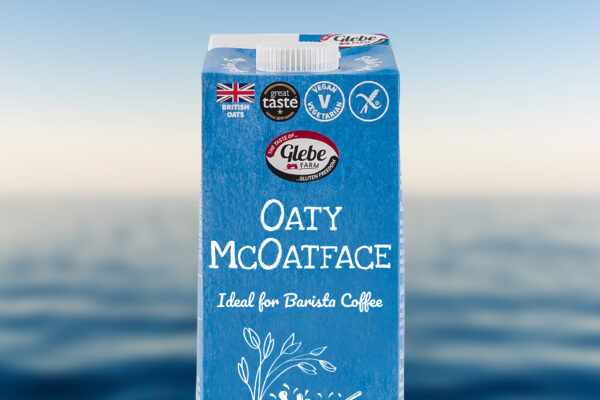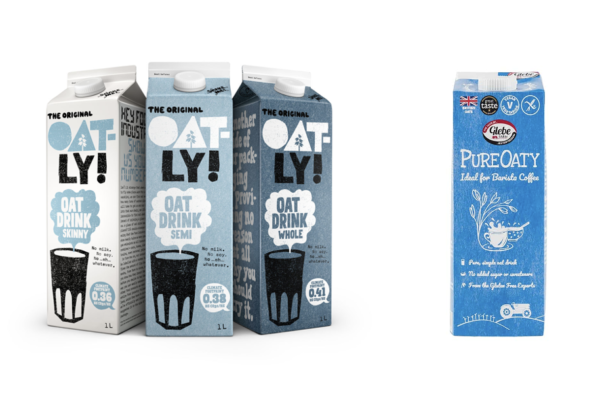Oatly loses court battle against British family farm
6th August 2021
A judge has dismissed Oatly’s claims of trademark infringement against Glebe Farm, in what has been described as a ‘David and Goliath’ style battle.
Multi-billion-dollar oat drink company, Oatly, prompted significant public backlash in June when it was revealed it had taken a small Cambridgeshire family farm to court over alleged trademark infringement.
Consumers and farmers alike took to social media to express confusion over the case, which claimed that PureOaty’s branding was too similar to Oatly’s own. Many were quick to point out a lack of obvious similarities between the two, while others accused Oatly of ‘bullying’ the family farm.
Now, it has been revealed that a judge dismissed all claims by Swedish company Oatly.
Commenting on the news on Twitter, Farmer Tom said: ‘I couldn’t be more pleased. Attempt any silliness here in the UK @oatly, and not only do you get sent home by the courts with your tail between your legs, but you get rightly and roundly ridiculed in press and social media. #NooneLikesaBully’
‘No likelihood of confusion’
The court case took place on 9th and 10th June and examined wide ranging aspects of alleged relevant intellectual property – including choice of language and typefaces, the use of the colour blue and the detail of a coffee cup appearing on the PureOaty pack.
However, Glebe Farm said the judge found there is no likelihood of confusion between the PureOaty name and look of the carton, and any of the Oatly trade marks. Further, the judge ruled against Oatly’s allegation that Glebe Farm intended to gain some unfair advantage, and having reviewed all the evidence and contemporaneous documents he was fully satisfied that there was no intention as attributed by Oatly.
A win for the small family farm
Commenting on the victory, Glebe Farm owner Phillip Rayner said: “We have had the threat of this court case – which has pitched our challenger brand against Oatly’s multinational business – looming over us for more than a year. We have always felt certain that we have done nothing wrong, and we were determined to fight Oatly’s claims that our brands were similar – something that is now proven to be wrong.
“You only need to look at the two products and packaging side by side to appreciate how different these brands are, and how unnecessary this legal action was.”
Mr Rayner continued: “Oatly has claimed that this legal action is just standard business practice. However, it was very clear to us that this was not the case. We decided it was time to stand up to this behaviour, and that in our view ‘corporate might does not make right’ […]
“It is enormously gratifying that the judge has ruled in our favour, and to see that smaller independent companies CAN fight back and win.
“The facts are that we have never wanted to be an Oatly clone. Pride in our own product aside, as British farmers we do not agree with any brand that comes across as anti-farming in its approach.
“Our brand name is PureOaty because our oat milk is made from pure gluten-free oats and just three other ingredients. The claimant has tried to cast our name incorrectly as ‘Oaty’ as an attempt to include that common word in their brand portfolio. However even if it were Oaty, would you expect everyone to be prevented from using the word ‘milky’ if a large multinational had trademarked ‘Milk-ly’?”

In order to get a little light relief in the midst of the court battle, Glebe Farm asked consumers to choose a new name for the drink, should it be forced to change it. Issuing a call-out for suggestions, the farm said: ‘And before anyone gets any ideas….we’re way ahead of you!! #OatyMcOatface.’
A public backlash
The case of a multi-billion-dollar company taking action against a small family farm led to significant backlash on social media – and a petition on Change.org saw 130,000 signatures in support of PureOaty and Glebe Farm.
Responding to the case, intellectual property firm Withers & Rogers has warned the outcome could be damaging to Oatly’s reputation.
Partner and trademark expert Mark Caddle said: “This is a victory for small producers that have worked hard and invested significant sums of money to bring their products to market. Although Oatly is a well-established brand, the case demonstrates that brands should be careful in selecting which trade mark claims to pursue. […]
“For Oatly, this result could be reputationally damaging and its decision to take legal action against a small producer could seem anti-competitive. Whether it will impact on sales in future is yet to be seen, but this case has proven that being a market leader doesn’t guarantee success.”
When the case came to light in June, even some of the brand’s former supporters appeared to be let down by the action. Twitter user Sophie Rollo commented: ‘I’ve gone from adoring @oatly to defending the company to now being grateful I didn’t invest in them and shaking my head. What a horrible and delusional power play.’ Another, Natalie Valerie, added: ‘Oh come on @oatlyUK… You’ve just lost me as a customer. The name isn’t even similar to yours.’
Following public criticism, Oatly said it had first tried to engage Glebe Farm in ‘constructive conversation’, but Mr Rayner said the “threat of legal action never felt ‘constructive’ and we felt there was no compromise or dialogue offered.”
Now, following the court case, Glebe Farm said they are excited to put it behind them and focus on serving their loyal customers.
Oatly has been contacted for comment.

